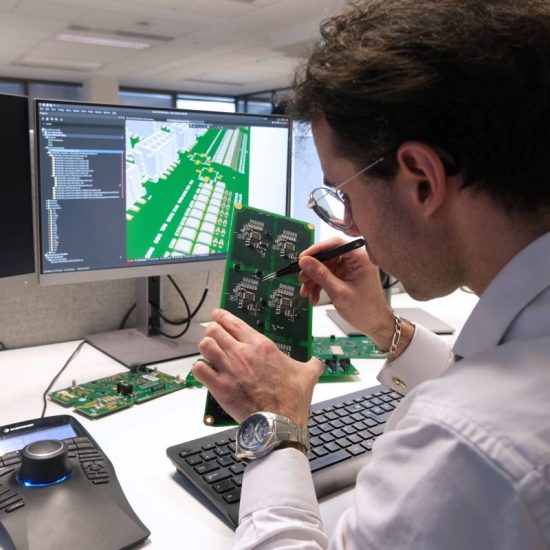BMS operation for lithium batteries
Made up of a combination of advanced electronic components (hardware) and on-board software (software), the BMS is a sophisticated electronic board that performs several key functions required for the smooth operation of a lithium battery for electric vehicles.
Constant monitoring of battery data:
The BMS continuously monitors key battery parameters such as voltage, temperature, current and capacity of each cell in real time. This enables you to collect precise data on the state of the battery and optimise charge and discharge management if necessary.
Charge and discharge management:
The BMS controls the battery charging and discharging process to maintain safe and efficient operating conditions. It regulates charging voltage and current, ensuring that the battery is neither overcharged, which can lead to deterioration, nor undercharged, which can reduce performance.
Communication and user interface:
Many BMSs offer a user-friendly interface that allows drivers to monitor battery information, such as state of charge (SoC), remaining range and consumption forecasts. Some BMSs also offer wireless connectivity for communication with other vehicle systems or remote monitoring applications.
Protection against hazardous situations:
The BMS is responsible for battery safety. It detects potentially dangerous situations such as overvoltage, overcurrent, overheating or short-circuits, and takes action to prevent them. This includes cutting off the power supply or limiting power to protect the battery and ensure the safety of vehicle occupants.
Fault prediction and diagnosis:
By continuously monitoring the battery, the BMS is able to detect early signs of failure or malfunction. It can make accurate diagnoses and provide warnings or alerts for preventive maintenance, avoiding unexpected breakdowns that tie up vehicles for long hours, and extending battery life.
Cell balancing:
In a lithium-ion battery, each individual cell may have slightly different characteristics. The BMS monitors and balances cell charge to avoid imbalances that could reduce total battery capacity or cause safety problems.
Promising BMS developments for lithium batteries in electric vehicles
With the rapid evolution of electric vehicle technology, battery management systems integrated into lithium batteries are also undergoing significant improvements. These developments aim to optimize battery performance, safety and durability, paving the way for more advanced and reliable electric mobility.
One of the most promising developments is the increased precision of measurement and monitoring. The new BMSs incorporate more sensitive sensors and advanced algorithms to provide even more accurate measurements of battery voltage, temperature, current and capacity. This enables better assessment of battery condition in real time, guaranteeing optimum performance and more efficient use of stored energy.
Finally, BMSs also incorporate advanced communication functionalities. They are able to exchange information with other vehicle systems, such as the energy management system or the navigation system, enabling more efficient coordination and optimum battery utilization.

Forsee Power at the cutting edge of electronics and functional safety for BMS development
At Forsee Power, our electronics department, made up of 40 hardware, software and tools engineers spread across all our R&D sites, are responsible for developing the electronic boards for the battery systems integrated into our customers’ buses, trucks, trains or off-highway.
The batteries in these vehicles are subject to severe constraints, and must be fitted with appropriate, tested electronics. For this reason, Forsee Power encourages vehicle manufacturers to turn to battery experts for the development of electronics, which would also help reduce intervention times in the event of a need for assistance.
At Forsee Power, we keep pace with market developments in component miniaturization, cell technology and automotive safety standards. As a result, all new Forsee Power batteries on the market incorporate BMSs certified to ISO 26262 with an ASIL C safety level.
This certification, carried out by an external body, guarantees that the BMS has been developed in compliance with the various key stages of the standard and tested according to the rigorous requirements of the standard. This certification thus provides manufacturers with assurance as to the reliability and safety of the BMS in normal use scenarios and in critical situations.

